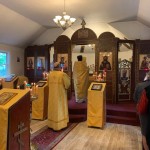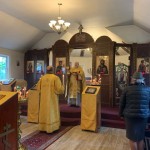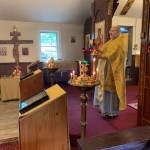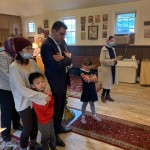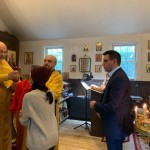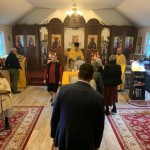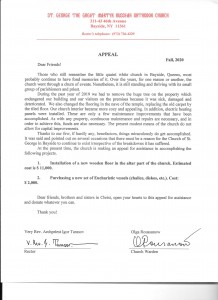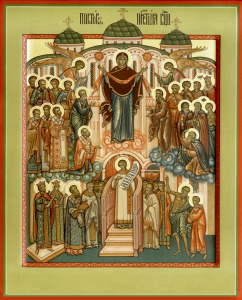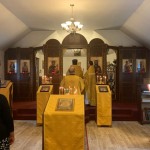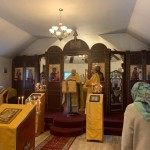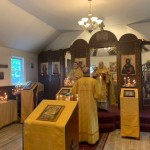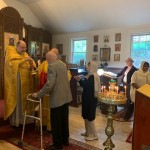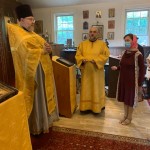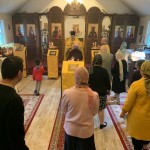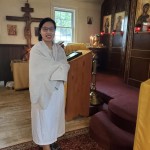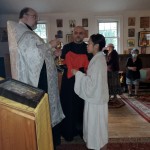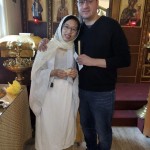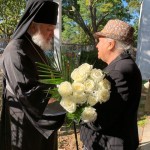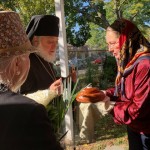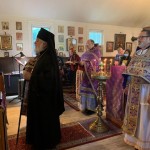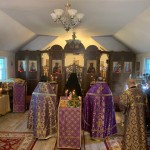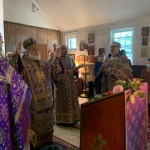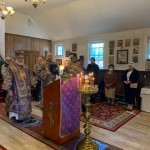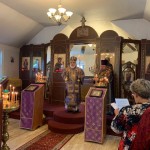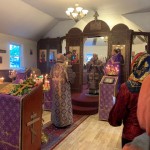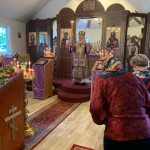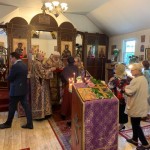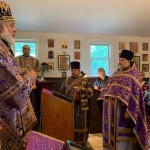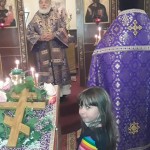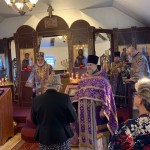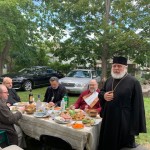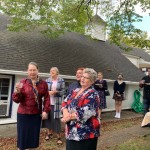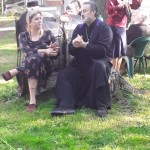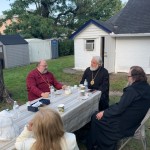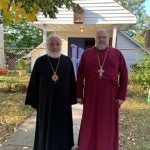On October 25, on the 20th Sunday after Pentecost, as well as Sunday of the Holy Fathers of the 7th Ecumenical Council, we had a beautiful celebration in our Parish. The Rector of St. George Church, Archpriest Igor Tarasov served the Divine Liturgy in our temple. After the Gospel lesson he preached the following homily in English:
“Dear brothers and sisters in Christ! Today we celebrate the 20th Sunday after Pentecost and we commemorate the Holy Fathers of the 7th, last Ecumenical Council of Nicaea. And today’s Gospel lesson tells us about rising of the son of the widow of Nain. This story can be found only in the Gospel of St. Luke. It shows that our Lord Jesus Christ had a great compassion towards people. Here we have a woman who first lost her husband and now was burying her only son. In the society of those days such a woman was predestined to live a poor and miserable life. Her husband was taking care of her. When he died, her son remained her only provider. Now she lost him. This is why Jesus seeing the funeral procession and being probably told about the situation, felt for that woman so much, as every kind man would feel. But Jesus goes further than that. He comes forth and says to the widow: “Do not weep”. And He touches the coffin and says to the dead young man: “Young man, I say to you, arise” (Lk. 7, 14). He performs the miracle and the young man comes back to life. In that we see the difference between Jesus and any kind man. Jesus is not just a kind man, He is the Son of God, He is the Lord”.
“As the Lord Jesus Christ performed great and astonishing miracles. One of them is described in today’s Gospel. Raising the dead young man was done by Jesus to show His power over life and death. Such a power could be possessed only by the Lord of the universe, only by God who created life and who is giving it to His creatures. We also remember that Jesus raised Jairus’ daughter and Lazarus. All these events had to demonstrate the power of God given to Jesus. Finally, Jesus was Himself risen from the dead. But we should note that all three raisings of the people described in the Gospels were acts of resuscitation which is different from resurrection. They were brought back to life, but would eventually die again. But their new life manifests Christ’s divinity, and gives assurance of His Resurrection and ours, a transformation to glory. Those miraculous acts also glorify God as the Giver of life and His Son, Jesus who would be specially glorified in His Resurrection”.
“This miracle teaches us that our Lord is the Master of our life and our death. He is the source of our existence. He created us and bestowed His gift of life on every one of us. However, this gift does not seem to be enduring forever. More than that, it seems to be vulnerable and perishable. Many unpleasant things threaten that gift: illnesses, accidents, crimes, wars, stresses and so on. They all may endanger our life and cause its termination. We try to preserve that precious gift, but we often fail. Realizing such a condition we should not despair. God gave us another precious gift – a gift of faith. It is supposed to make us strong and wise during the course of our earthly life. It has to teach us to make right choices and to believe that earthly life is not the only life we possess. We believe that eternal life of the soul awaits us after death. We also believe that eternal life of the risen body awaits us after the resurrection of the dead”.
“Commemorating the Fathers of the 7th Ecumenical Council we have to recall that those Councils defined what is our Christian faith, what this gift of faith is about. And it is important to have a true and correct understanding of what we believe in. Today’s second Epistle lesson says, “Jesus Christ is the same yesterday, today, and forever” (Hebr. 13, 8). Thus we cannot change that faith, and if someone alters that gift of faith or alters our morals, he deviates from the teaching of the Fathers, teaching of the Ecumenical Councils and from the teaching of Christ who is always the same. We are now disturbed by what happened last week: the bishop of Rome stated that homosexuals should have a right to marriage unions supported by the states. In this way the head of the Roman Church deviated from the teaching of the Church; he attempts to alter the teaching of Christ. It is unheard that a Catholic could say so, but it happened. And we, Orthodox, should firmly reject such ideas and not deviate from our holy faith and our pious morals. Things in the world do change and we may adapt to those changes but we cannot change the way we believe, the way we worship and we also cannot alter our moral values. Because, as we mentioned,“Jesus is the same yesterday, today and forever””.
“Dear brothers and sisters! Our faith tells us also that earthly death came to existence due to the sin of our ancestors. Adam and Eve did not have to die. God explicitly said to them when they will die: if they would eat the forbidden fruit. After eating that fruit Adam died spiritually and became subjected to physical death of the fallen and corrupted body. Only our Lord Jesus Christ, the Son of God and the Son of Man could trample death by His Resurrection. He destroyed that enemy of humanity. No one else could do it, but God. No one else could give the son of the widow back to his mother. And no one else after death can give our soul to our body again. Although death still exists and takes its toll from the sinful mankind, we all live and die with the great hope for the eternal life with God and for our own resurrection with Jesus. One day He will come and say to every one of us: “I say to you, arise.” And we will. We will begin everlasting life, so let us prepare for it by good works of faith, hope and love”.
During the Litany of Fervent Supplication, Fr. Igor proclaimed a petition beseeching the Lord to spare the faithful from the outbreak of the disease.
The choir nicely performed Psalm 33 during preparation for Holy Communion.
Following the dismissal of the Liturgy the Rector preached a short sermon in Russian addressing the main ideas of his English homily. He also made an announcement regarding renovations in the altar area of the temple. The work will begin next week and is supposed to be finished before November 8. Thus we are not going to have the Liturgy next Sunday, November 1 and parishioners should refer to the November schedule of services.

